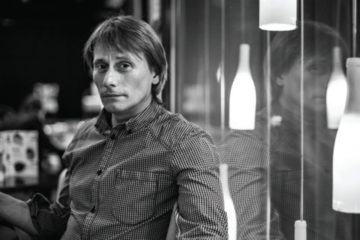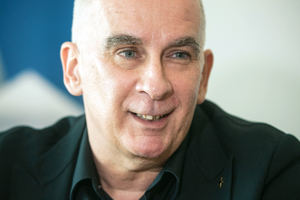
Alain Cardon: A French coach fascinated by Romania
International consultant and Master Coach with a broad practical experience (in Europe, the Middle East, America and Africa), the founder of many training companies (the most famous being Métasystème), Alain Cardon is specialized in team coaching and leading international organizations.
Born in Algeria, he grew up in Egipt. After high school, he went to complete his studies in the United States, and in 1973, when he was 24 years old, he chose to settle in France. He is known in Romania due to his seven books now translated in Romanian.
You are a business coach working in Romania. What is a coach?
My work consists in accompanying people and business development. It could be with individuals, teams, and organizations. When with an organization, the CEO calls me to accompany major change in the company. When it’s a team or an individual, it is the same thing – a leader or a person calls me with a development concern or ambition.
Now coaching is not the same as teaching. I don’t have any knowledge or techniques to share. Coaching is not psychology nor a therapeutic approach. It is a sort of questioning and challenging approach. The word “coaching” comes from sports: Imagine an extraordinary Olympic judo champion who knows everything there is to know about judo. This champion still has a coach. The coach will not teach the champion anything, because the latter is already Olympic. The coach is not a therapist either, as there is no problem or cure involved. But the coach accompanies the champion to explore how to improve his own style in his own way. That’s the champion’s inner game: what does the champion need to do to become better than himself? The inner game is what’s in the client’s mind and heart and soul and everything else – it is the client’s way of being and succeeding.
You can imagine that those who really succeed will start failing at one point – the first step to a big failure is always a big success. Take Nokia or Kodak or other companies, which once were at the top. They had no more challengers. They did not have stimulating benchmarks. It is tempting for winners to say: “OK, I have made it!” This can be very well the beginning of their end – with arrogance, more and more blind spots, being sure they know it all, so they don’t listen anymore. A coach’s role is often to accompany succeeding professionals in what they already know how to do well. This is my job, worldwide, with marketing and finance organizations and specialists, airline pilots, hotels chains and managers, in mining, with banks and insurance companies… Any kind of human activity or business can be coached.
Personally, I’m positioned as a business coach, but that’s an illusion: I could be coaching a middle age CEO, or an organizational reconfiguration, or a woman that’s having personal health issues, or someone who’s going through a divorce, or a leader that wants to really stimulate her company’s growth and development, etc. and all these issues might appear as I work with one same person. When you accompany somebody, everything they do is connected. People are coherent. A leader may have issues at home that may be the same at work. If as a manager, you have difficulties or challenges with somebody on your team, there is a good chance you have the same difficulties with one of your children at home. In life, there are always repetitious patterns. Likewise, if you find a way to move forward in one part of your life, you’ll usually find the same solutions fit in other areas of interest. Things come together and life is fractal. Major changes in life can happen in the same year: You sometimes almost simultaneously change your house, your car, your job, your city, your looks, etc.
Of course, everyone also has a life experience. It is all about knowing your life experience, understanding it and using it to the fullest. Coaching does not have the monopoly on change – life has the monopoly here! And if you don’t learn from one experience, there is often a repeat to get another chance, and another. Most people have noticed that if they have difficulties with their team or boss and quit to go to another company, it doesn’t help: they usually find the same kind of team or boss in the new place. Some people have difficulties at home and divorce. They then marry someone else, and everyone can see that nothing has changed: practically the same patterns occur in the new setting. So coaching is accompanying people within their patterns, in their development, by starting where they are. It is about seizing or creating opportunities for personal and collective growth. Coaching is not necessarily focused on quantitative or qualitative results. It is on both, when and where all things come together.
How did you become a coach?
That is a long, long story or a short one. The short version is that I trained and passed exams in 2002, to be exact. – For the long version, it depends on how far back I look. One of my first jobs in 1976 was in corporate training. From this I gradually moved into consulting and from there into coaching. So since I was 27, I have long been in the same kind of profession, accompanying people’s professional development in different ways. I’ve also managed several consulting companies, and accumulated management experience. I undertook various therapies, to do some psychological work on myself, to reflect on who I am. Now, if I look before all this, for instance when I was in high school, I then taught younger kids carpentry or basketball or tennis. I was good at sports and kids saw me as a model. They would come naturally to ask me things and I always volunteered to help them. So I was already in some kind of teaching position in high school.
But maybe my whole life story is a sort of accidental coach training, by karma or destiny. I was born in Algeria of French parents. My father was from Northern France while my mother was born in Egypt, because her father had worked there, in the Suez Canal Company. I was two when my parents divorced. My mother went back to Egypt, married again, and from there on, I had multiple fathers. This is what we’d now call multiple reporting in organization, which means you have multiple bosses. So I grew up with multiple father figures: the second was Egyptian and the third was French. I have brothers and sisters of different origins. It’s not a very traditional family structure, especially if you go back to the ’50s and ‘60s. Ours is a network family, with time-sharing and distributed matrix management. So, my early family structure taught me all about network systems very quickly.
Later, when I talked to my therapist about all this, he needed diagrams to understand. He would get lost in the complexity. For me, it was normal – when you grow up in any system, you consider it normal. It took me a number of years to understand that other families were actually not like mine. They had stability, they had constancy, they had simple structures. Today, as a coach, I am not surprised when I face start-ups or complex systems with matrix management, international levels, multiple reporting, distributed teams, high degrees of uncertainty. I was built or trained for this, in a certain way, from my childhood.
So if you ask me what brought me to coaching, I could therefore say that my whole past is a kind of training for who I am and what I do today. But actually, this is the case for everybody. I happen to have an apparently exotic type of past. But everybody has a specific exotic past. Each of us needs to use their heritage to the fullest, to use what they were specifically built for in order to become more performing. There is no reason to reject or regret one’s past – just use it to the fullest. It is what I had to do for myself, and it is part of my job as a coach: I listen beyond people’s words to help them uncover their fundamental structure and calling, and then help them really take advantage of it.

What Egypt’s influence on your life?
Also complex! My first education was French, until the Suez war of 1956, when the French left Egypt. I was seven. My mother then put me in an American school. From then on, my whole formal education was American. When I got my high school degree in Egypt in 1967, there was another war, so I went to the United States and continued in an American college in Minnesota. My American education formed my mind, whereas French is my mother tongue; and Arabic and the Egyptian context is something deeper. It concerns fundamental intuitions, emotions and a spiritual dimension. Egypt, the Nile valley in the ’50s and the ’60s was not the image we have about Egypt today. There is huge history in Egypt, the first Christians, the first Jews, the first everything.
When I go back to Egypt today, I have the feeling I’m getting back to my pre-historic roots. Egypt was highly influenced by the Turkish Ottoman Empire for a long time. In Romania, today, I can also feel this influence through the words for food, such as ciorba – in Morocco it is the same word. So coming to Romania, much later in 1998, when I was 49 years old, I had the feeling of something like Cairo, because of this Levantine influence. For me, coming to Romania is almost like going back to something I already know. This is the Levantine heritage in Romania. So here, I found a lot of things in me from Egypt and that past. That helped me to understand Romania differently than if you just say Romania is a Roman language and a Roman heritage. Like in Egypt, there are a lot of other layers here. I don’t know much about the Dac heritage, but I really feel the same as in Egypt. In terms of Turkish, Balkan and Dac influence, Romania has a different and more complex European heritage. Not only a Roman or Protestant one.
What about your U.S. experience?
When I was 18, after the Six Day War I got a scholarship that could pay for my first year in college in the States, and then I started working in a factory that paid for the rest of my education. Minnesota was completely different than anything I knew: minus 20 degrees or even minus 50 with the wind factor. Coming from Egypt, that was a shock! Moreover, between 1967 and 1973 The US was going through a whole cultural shift. Remember the anti-Vietnam, flower children, rock festivals, LSD revolution? I went completely into that. In a way I went native, getting into that culture and experiencing communal living and all that flower power ideology. This experience was also somewhat spiritual with a lot of people taking drugs, experimenting with mind-expanding exercises – yoga, vegetarianism, meditation, etc. That counter-cultural experience also influenced my thinking. When you are raised between three cultures, you are naturally open to more. I then started mixing other cultures and other influences, like the Far East, meditation and other trends, I completely immersed in them. My issue then and now is to make sense out of all of that. More than multicultural, it is to become meta-cultural.
Even now, I think I can pass like a real American from that period. I lived through it with them. But during that period, America was really questioning itself! In College, I studied all types of so-called useless things, such as Philosophy, Ethnology, Political Science, Political Geography… I was more into thought patterns, the influence of cultures and places. I was trying to get some understanding of the complexity in myself. So today, if you were asking what kind of education I have, I would say I’m more of an ethnologist than anything else. With all that traveling, I’m also into linguistics. Not in a literary way, but more in terms of how language both reveals and influences mind patterns, if not our sense of reality. So I would now say that actually, part of my foundation as a coach is linguistics: in knowing how to put the right questions, with the right inflexions and the right energy… to challenge and really shake frames of references, to open up to new ways of seeing the world. If coaching is my profession, it rests on linguistics and ethnology, and that rests on my past lives.
What about Romania today?
The Romanian context is different from others, but I think Romanians are the same as others. Humans are humans. We could say that one recent determining factor in present-day Romania is the 1989 change of regime. From one extreme, a very controlled state, the country very quickly turned to another extreme, a state without controls. People thought that in a free economy, everything is possible. You know – you take a piece of public land, build your garage on it, and the land is yours. Now, very gradually, people have to come to some kind of order: a free economy doesn’t mean that everybody can just take what is public.
I would say Romania is still in a transition, moving away from extremes and gradually getting into an understanding of how to work in a free economy, by respecting others and a minimum number of rules, by being ethical and responsible, etc. If the same thing had happened in any other country, this learning process would be the same! If you take the wild American Far West as an example, when civilization spread westwards, they had to take bandits and offer them to become sheriffs. A lot of killers became sheriffs; it was a way to start bending towards civilization. It is like hiring ex-hackers to stop hackers! Today, in Romania, many profiteers who have seized opportunities now have to learn to become legal and respectful. They are just like the famed robber barons in the States. This transition is still happening here, but this could have happened anywhere else. It has.
And your work here in Romania?
My first time in Romania was with a French client I had here in 1998. I then met my present wife. Like I said, the shock coming to Romania was finding part of my childhood here. When I heard that the Cairo movie scenes for “The English Patient” were filmed in Bucharest, it made a lot of sense. The cities were so similar in terms of ambiance, even though we say that Bucharest is the Little Paris. Bucharest is also a city out of the fifties that has a familiar Mediterranean or Levantine feeling to it. Anyway, I kept on coming to Romania to work with companies as a coach.
Gradually, in France, people also asked me to teach them what I do. So in Romania and in France, I simultaneously developed a coaching school. More and more people were interested in the way I coach- I call it systemic coaching. That’s a way of looking at things, and accompanying people and organizations with a more global, meta-cultural or all-inclusive view. Therefore I developed two activities or two complementary businesses of which one was the school. In Romania, the Metasysteme-Coaching school really contributed to the development of the local coaching community. Here, there are now many coaches I’ve trained and a clear influence of my specific type of systemic coaching. It’s like a school of thought.
In France, my school also has a very good reputation. The coaches that I trained clearly have a different style. It is not a copy of mine. They adapt it, but you can feel the origin, the kind of thinking and the kind of tools they use, the approach they have, there is a mark on it, or even a brand, although it’s not a formal brand. To support this development, seven of my books have been translated into Romanian. Actually in France, I have been published 15 to 20 coaching and management books.
So I have these two complimentary activities. On the one hand, future coaches, managers and entrepreneurs come to my coaching school. Not to learn to be coaches, but to learn how to think differently – so I train coaches, managers and entrepreneurs. They want to continue what they do with a coach’s perspective – in other words, with the capacity of expanding their frame of reference, their thinking patterns to question their professions and lives in a different way. On the other hand, I also work within companies with team and organizational coaching. Last week, for example, I had some 84 people from one corporation for three days in a large ballroom. They all worked on different professional issues in small groups, to develop both their company’s culture and better their results. This included the executive team, the CEO and the whole next level. I hope to see them again in September or October and then again in January or February, to follow up in terms of organizational development. I could also work some small teams in that organization – that would be team coaching – and I also work with some individuals, which is one-on-one professional coaching.
Why do people call you?
I would say in that France people call me more to teach them how to become coaches; the school is more central. I think there is more energy in Romania than in France where people and systems are more rooted in their routines. Maybe that will change with the recent elections, but whether France is in a crisis or not, growth there is only between 0 and 2%. It’s not a very dynamic, open country like Romania, which has the fastest growth in Europe today – 4,5%. That’s even better than Ireland. So in Eastern Europe, more companies call me for internal team and organizational coaching, to help them really change their business results. This is in Romania and also Slovakia, the Czech Republic, Hungary, Turkey…
So Romania is more open to moving fast, finding new ways to explore and push limits. Also, there needs to be a big cultural shift in most organizations, because many of them are built on paternalistic and materialistic models. Many are either being nice with all the personnel, giving them lots of perks and money in order to keep them, or they are being very controlling and directive. These are two similar forms of top-down cultures. These are both standard models, but they are quite limiting. The change towards more dynamic, start-up kinds of cultures, where everybody is completely committed and moving and taking ownership is not very natural here, especially in companies that have more than 200 people. Smaller start-up delegating cultures are more dynamic. When organizations become administrative, with centralized financial controllers and HRs, it’s like with the Communist Party: they just want to keep the people under control. It’s a de-motivating top-down system. The future world calls for an evolution towards really dynamic, fast moving company cultures, with everybody taking ownership, really moving fast, participating in a collaborative mode. This is what I do. I’m a network person. I know how to accompany this shift really well.

What do you like about working in Romania or being in Romania?
Romania is my wife’s country. I married into Romania. There is obviously something that attracts me on a deep level here. I find Romania to be a very spiritual country. People and places are spiritual. They are religious, but more than religious. They have strong beliefs and rituals. In some cases, looking at it from outside, you could almost call it superstitious. I don’t believe it is superstition. I have the feeling it is something that is connected to the country. When many Romanians go abroad to live, they always want to come back. They cannot find themselves in other countries. There is something in them that keeps them linked to Romania. For instance, the French, English or Americans can go anywhere and become arrogant, thinking their country is better. But when Romanians criticize other systems, it’s because they are missing something they don’t have anymore. They want to come back home to find here. Here, they have very strong family connections, and friendships are real – you can have very good friends in the States, but if you leave the city, you’ll never hear from them again. If you have good friends in Romania, you can go wherever in the world, and they will keep calling you. The connection stays, it’s not a question of distance. I would say that in Romania, heart and soul connections are much more present, much more constant, than in other places.
There is also more and more positive energy in Romania. I think people understand that their country deserves better. They have started to be impatient about what’s going on. This is building up; it’s slowly coming! When I first came, Romanians had a big complex because things were not modern and so on. They now realize they have a quality of life they are not going to have in another country. This quality of life is not necessarily per capita income, but the type of relationships, the quality time you have, even the natural environment. There are a lot of beautiful things about Romania that Romanians are starting to see. I find that Romanians are also very creative; you have a creatively dynamic and intelligent society. You can see that Romanians win all the prizes in mathematics, that in foreign universities, Romanians are always the best. At the Cannes Festival, when you see a good movie, there is at least one Romanian doing an excellent job.
Now this mixes well with the Romanian complex. Romanians are not so arrogant. The French believe that France is the center of the world. Romanians love their country but no one thinks it is the center of the world.
Romanians are also not used to taking compliments, they don’t want to believe in them. I remember a number of years ago, I was telling my wife and other people that this country was developing well and that you could shortly expect much bigger growth. Everybody would say: “No! What? Romania? Impossible…” When the growth came, the same people said that it was because there was a lot of catching up to do…”we come from so very far…” It was just normal. There is a serious tendency here to be very humble – That is what you call “smerenia”.










